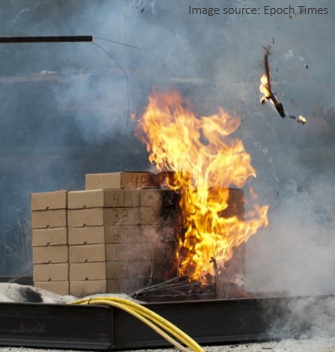
This is part 1 of a 2-part blog addressing the International Civil Aviation Organization’s (ICAO) recently enacted ban on the shipment of lithium-ion batteries as cargo consignments on passenger planes and the associated supply chain risks of such provisions. In part 1, we look at the lithium-ion battery supply chain in context and examine the ban stipulations. In Part 2, we discuss why many shippers and advocacy groups disagree with the prohibition, and what this ban can mean for supply chain and procurement professionals.
The ICAO – a United Nations agency regulating the transport of dangerous goods on aircraft – has enacted a controversial ban on the shipment of lithium-ion batteries as cargo on passenger aircraft. Due to long-standing concerns from pilots and plane makers that lithium-ion battery (LIB) consignments present a critical fire risk aboard aircraft, the ICAO’s 36-state governing council declared the prohibition along with other LIB battery shipping regulations, effective April 1st, 2016. Shippers and advocacy groups argue the prohibition unnecessarily impacts the battery supply chain without addressing the true safety risks associated with transporting LIBs.
As rechargeable LIBs grow more prevalent across consumer electronics and electric vehicles, it is important for supply chain and logistics practitioners to be aware of how such a regulation change can impact the global conveyance and availability of components in high demand. SCM practitioners realize that supply continuity risks associated with one component can delay an entire finished product. Thus, companies with products reliant on lithium-ion batteries are encouraged to familiarize themselves with the ICAO’s new regulations and prepare accordingly.
Lithium-Ion Batteries in Supply Chain Context
Lithium-ion batteries have become one of the most common types of rechargeable batteries used today. Beyond powering portable consumer electronics, LIBs are now utilized in a wide assortment of products and industries, such as the military and aerospace industries, medical devices, e-cigarettes, electric vehicles and golf carts, hand tools, etc.
LIBs are industrially viable for good reasons as well. LIBs with cobalt cathodes hold twice the energy of nickel-based batteries and four times that of lead-acid batteries. With low self-discharge and near-zero memory effect, LIBs do not require scheduled cycling to prolong battery life, are easily disposable, and provide longer runtimes than other batteries. Given that certain precautions are met when charging, discharging, packaging, and shipping LIBs, lithium-ion cells can be safer in comparison to lithium metal batteries and other high energy density cells.
However, many pilots and aviation authorities believe LIBs present a palpable fire safety risk aboard passenger aircraft. “Thermal runaway,” also referred to as ‘venting with flame,’ can occur when a single battery cell within a consignment short-circuits, quickly increasing the battery’s temperature. During a thermal runaway, the high heat of the failing cell can then spread to the next cell, causing it to become thermally unstable as well. In some cases, a chain reaction occurs whereby an entire consignment pack can go up in flames within a few short seconds, or linger on for several hours as each cell is consumed one by one. Fires resulting from thermal runaway can reach up to 1,100 degrees Fahrenheit, are virtually inextinguishable by conventional means, and powerful enough to melt through the aluminum body of an aircraft. Though not definitively connected, several onboard fires and downed planes in the recent past have been attributed to the carriage of lithium-ion battery consignments in passenger aircraft bellies.
But as LIB-reliant industries mature and the resulting lithium-ion cell demand grows, so does the demand for the swift delivery afforded by airfreight. Currently, 70% of LIB bulk shipments are transported by cargo ship and 30% are shipped by air. Of that 30% shipped by air, more than half of LIB consignments are shipped exclusively by cargo aircraft.
Nevertheless, commercial passenger planes have been significant in the global conveyance of LIBs. Passenger aircraft have enabled the shipment of LIBs for life-saving medical devices to people in remote areas and permitted smaller operations with smaller shipments to reach global markets. Companies are also able to benefit from the higher frequency and availability of commercial flights.
Ban Stipulations
The 36-state ICAO Council’s new aviation safety measure now prohibits all shipments of lithium-ion batteries as cargo on passenger planes on an interim basis until new fire-resistant packaging standards are developed, expected sometime in 2018.
The prohibition only pertains to standalone lithium-ion batteries shipped as cargo (as per UN 3480 Packing Instruction 965) and not to those contained in personal electronic devices carried by passengers or crew. It also excludes cargo shipments of products in which lithium-ion batteries are packaged (i.e. laptop and cell phone consignments), which could provide a measured sigh of relief to shippers of finished goods.
In addition, lithium-ion battery shipments on cargo aircraft are subject to new packaging standards and safety measure provisions. These include:
- Lithium-ion cells and batteries must be offered for transport at a state of charge (SoC) not exceeding 30% of their rated design capacity. Cells at an SoC of greater than 30% may only be shipped with the approval of the State of Origin and the State of the Operator under the written conditions established by authorities.
- All packages must bear the designated “Cargo Aircraft Only” label in addition to the other marks and labels required by the Regulations. The Cargo Aircraft Only label must be clearly visible or affixed on the outside of the cargo overpack.
- A shipper is not permitted to offer for transport more than one package in any single consignment.
Are these safety measures or just unnecessary hurdles? What does this mean for supply chain practitioners? Read Part 2 of this article tomorrow to follow the conversation.




